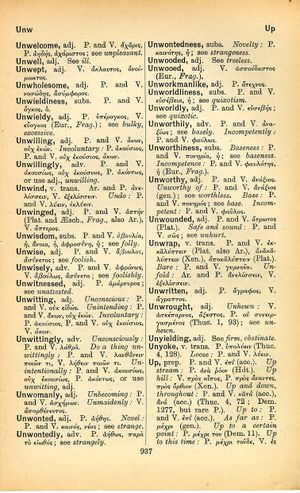up: Difference between revisions
Οὐκ ἔστιν οὐδὲν κτῆμα κάλλιον φίλου → Nulla est amico pulchrior possessio → Als einen Freund gibt's keinen schöneren Besitz
mNo edit summary |
m (Text replacement - "<b class="b2">Av.</b>" to "Av.") |
||
| Line 24: | Line 24: | ||
<b class="b2">Well up in, versed in</b>: P. and V. [[ἔμπειρος]] (gen.). | <b class="b2">Well up in, versed in</b>: P. and V. [[ἔμπειρος]] (gen.). | ||
<b class="b2">Be well up in an author</b>: Ar. and P. πατεῖν (acc.) (Ar., | <b class="b2">Be well up in an author</b>: Ar. and P. πατεῖν (acc.) (Ar., Av. 471 and Plat., ''Phaedr.'' 273A). | ||
'''adv.''' | '''adv.''' | ||
Revision as of 10:40, 30 October 2019
English > Greek (Woodhouse)
prep.
P. and V. ἐπί (acc.).
Up stream: P. ἀνὰ ῥόον (Hdt.).
Up hill: V. πρὸς αἶπος, P. πρὸς ἄναντες, πρὸς ὄρθιον (Xen.).
Up and down, throughout: P. and V. κατά (acc.), ἀνά (acc.) (Thuc. 4, 72; Dem. 1277, but rare P.).
Up to: P. and V. ἐπί (acc.).
As far as: P. μέχρι (gen.).
Up to a certain point: P. μέχρι του (Dem. 11).
Up to this time: P. μέχρι τοῦδε, V. ἐς τόδʼ ἡμέρας (Eur., Alc. 9), P. and V. δεῦρο (Plat. and Eur., Heracl. 848); see hitherto.
Come up with, reach: P. and V. ἐξικνεῖσθαι (gen.); see reach.
Overtake: P. ἐπικαταλαμβάνειν; see overtake.
Well up in, versed in: P. and V. ἔμπειρος (gen.).
Be well up in an author: Ar. and P. πατεῖν (acc.) (Ar., Av. 471 and Plat., Phaedr. 273A).
adv.
P. and V. ἄνω, Ar. and P. ἐπάνω.
Up and down: P. and V. ἄνω κάτω, ἄνω τε καὶ κάτω, P. ἄνω καὶ κάτω.
Hither and thither: see under thither.
The up country: P. ἡ μεσογεία; see inland.
Go up country, v.: P. ἀνέρχεσθαι (Thuc. 8, 50), ἀναβαίνειν.
Be up (of time), be passed: P. and V. παρελθεῖν (2nd aor. of παρέρχεσθαι).
Go up: P. and V. ἀνέρχεσθαι, Ar. and P. ἀναβαίνειν.
Set up: see under set.
Stand up: P. and V. ἀνίστασθαι; see rise.
It is all up with me: use P. and V. οἴχομαι (Plat.); see be undone.
Shall we say it was all up with these things? P. πάντα ἔρρειν ταῦτα... φήσομεν; (Plat. Legg. 677C).

